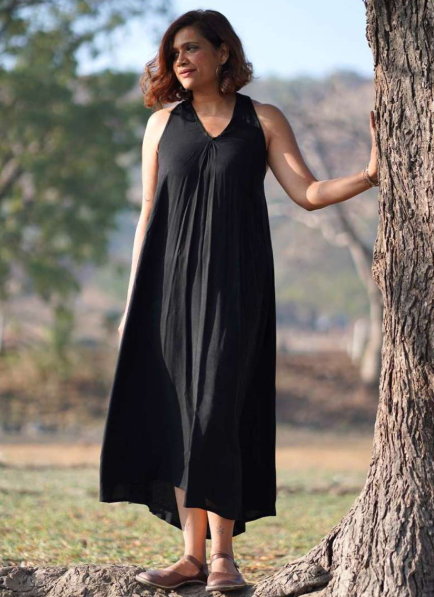
The Bamboo Dress: Embracing Sustainable Fashion with Style
In recent years, sustainability has become a driving force in the fashion world, leading to the rise of eco-friendly clothing options. Among these, the bamboo dress has emerged as a standout, offering a perfect blend of comfort, elegance, and environmental consciousness. This article explores why the bamboo dress is becoming a popular choice for eco-conscious fashion enthusiasts.
The Environmental Benefits of Bamboo
Bamboo is rapidly gaining attention for its sustainability. Unlike traditional cotton, which requires significant water and pesticide use, bamboo grows quickly and thrives without the need for chemicals. Its cultivation requires minimal water, making it a more eco-friendly option compared to other fabrics. As a result, bamboo fabric has a much lower environmental footprint, which is a major appeal for those looking to reduce their ecological impact through fashion.
Aesthetic Appeal of Bamboo Fabric
Bamboo isn’t just sustainable—it’s also stylish. Designers have recognized the unique qualities of bamboo fabric, creating dresses that are as fashionable as they are eco-friendly. Bamboo’s natural softness and breathability give it a luxurious feel, while its subtle sheen adds sophistication. The fabric drapes beautifully, creating flattering silhouettes that enhance the body’s natural curves, making bamboo dresses a chic addition to any wardrobe.
Unmatched Comfort in Every Wear
Comfort is a key factor when choosing clothing, and bamboo fabric excels in this area. Bamboo has natural temperature-regulating properties, keeping you cool in hot weather and warm when it’s cold. This versatility makes bamboo dresses perfect for all seasons. Additionally, bamboo fabric has anti-bacterial qualities that help reduce odors, allowing the dress to stay fresher for longer, even during active wear.
Durability of Bamboo Clothing
Sustainability is not just about how the material is sourced, but also about how long it lasts. Bamboo fabric is durable, meaning bamboo dresses retain their shape and color after multiple washes. This longevity is crucial for sustainable fashion, as it reduces the need for frequent replacements, ultimately minimizing textile waste. Bamboo dresses are built to withstand everyday wear, offering both style and durability.
Bamboo and the Circular Economy
The bamboo dress fits perfectly into the concept of a circular economy. Unlike synthetic fabrics, bamboo is biodegradable, meaning it decomposes naturally at the end of its life cycle. This contrasts sharply with garments made from non-biodegradable materials, which can sit in landfills for years. Bamboo’s ability to return to the earth without leaving a harmful footprint makes it an ideal choice for those invested in a more sustainable future.
The Ethical Appeal of Bamboo Dresses
Ethics play a significant role in the appeal of bamboo dresses. Many brands that use bamboo are committed to ethical production practices, ensuring fair wages and safe working conditions for their labor force. This ethical approach, coupled with the environmental benefits of bamboo, offers consumers peace of mind, knowing that their purchases are contributing to a better world.
Easy Care for Eco-Friendly Fashion
One of the advantages of bamboo fabric is its ease of care. Unlike some other eco-friendly materials that may require special washing instructions, bamboo fabric can generally be machine washed on a gentle cycle. This simple maintenance routine ensures that the dress retains its integrity, functionality, and eco-friendly properties over time, further enhancing its sustainability.
A Versatile Wardrobe Staple
The bamboo dress is more than just a sustainable option—it’s a versatile piece that fits a variety of styles. From casual daytime wear to elegant evening dresses, bamboo fabric can be crafted into a wide range of designs. This adaptability proves that sustainable fashion doesn’t have to compromise on style or creativity. Bamboo dresses seamlessly blend eco-conscious living with high-fashion trends, offering choices for every occasion.
Consumer Demand for Sustainable Fashion
As more consumers become aware of the environmental impact of their clothing choices, the demand for sustainable alternatives like bamboo dresses continues to grow. People are increasingly seeking fashion that aligns with their values, driving the popularity of eco-friendly materials. This growing demand is pushing brands to offer a broader range of sustainable options, ensuring that consumers have access to stylish and responsible clothing choices.
Bamboo Dresses: A Step Toward Sustainable Living
For those committed to living more sustainably, a bamboo dress is a practical and stylish choice. Wearing bamboo is not just about fashion—it’s a statement about environmental responsibility and ethical consumption. As more people embrace eco-friendly practices, choosing bamboo clothing can become an important part of a sustainable lifestyle.
The Future of Bamboo in Fashion
The future of bamboo in the fashion industry looks promising. As technology advances and awareness about sustainable materials increases, the potential uses for bamboo fabric will likely expand. From clothing to accessories, bamboo’s versatility and eco-friendly qualities ensure its place in the future of fashion, providing more options for eco-conscious consumers.
Conclusion: Bamboo Dresses as a Symbol of Eco Chic
The rise of the bamboo dress is a clear sign of the growing importance of sustainability in fashion. This eco-friendly garment embodies the principles of both style and responsibility, offering consumers a way to embrace fashion without compromising the planet. With its comfort, durability, and stylish appeal, the bamboo dress is a perfect example of how fashion can contribute to a more sustainable and ethical world.
